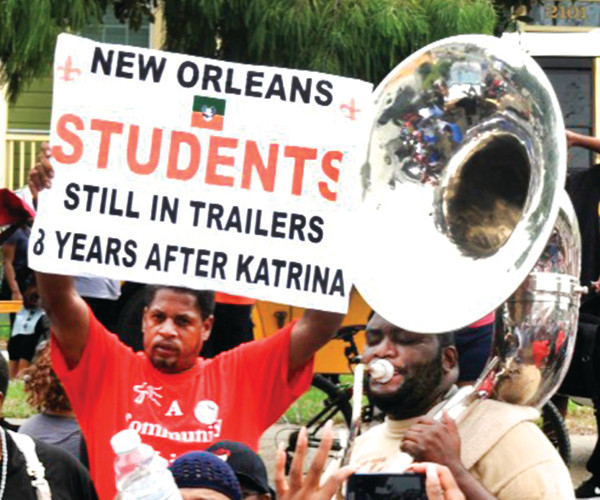
PHOTO/TED QUANT
The People’s Tribune’s Joseph Peery interviewed DJ Markey, a leading advocate in the fight for equal quality education in New Orleans. This is part two of a two-part interview.
People’s Tribune: What’s the solution to what’s going on in education?
DJ Markey: Well, first we have to have a public conversation. The privatizers, like “New Schools for New Orleans” are the authors of the initial report to which we responded. Their focus is something quite different. That’s the one that says reforming schools in New Orleans is a model for the whole country to use. We know that’s not true. Schools must provide a 21st Century education for all children, including children with disabilities and with language differences. Returning schools to local control would be an important first step. The majority of the schools here are run by private boards and are not elected by anybody in the city. Public funds are expended and that’s the only connection we have with calling it public education. Under this arrangement, the tax paying public does not govern these schools.
PT: Local communities are up against a national strategy. If this can be done in the interest of the rich, why can’t we do the same thing in our interest?
DJ: That’s an interesting conversation. We have been having it here for some time. We have what’s called the Minimum Foundation Program. It’s the way education is funded. Governor Bobby Jindal has been taking the money directly out of this program to fund his voucher program. If you follow the money, you see that undercutting public education in this way does not portend well for the future. When you look around the country at areas where public schools are being charterized, you see lots of poor kids and lots of kids of color affected by school closures. You don’t have charter schools so much in rural areas; privatizers have gone after major urban centers. The policies coming out of Washington DC have assisted those entities seeking to privatize public education, so it is a national effort. More people are becoming aware that this is not in the long-term best interest of public education.
PT: How can we fund education in a more fair and equitable way for our children?
DJ: As far as policies coming out of the Federal government, there is no incentive to address equity. Re-prioritizing public education by taking money from the military budget to fund real change should be an important topic for our public conversation. We need more teachers, schools, programs, support for all kids to break the school to prison pipeline, more counselors and social workers. This will require more investment, especially from the federal government. We’re still struggling with those ideas. In New Orleans, when we talk about rebuilding schools, the question is always: Who will run them? How will they impact the community? What’s will be taught? Will the quality of life for the kids in this community be better? Is it going to bring communities back together? Those questions are unanswered. Bringing communities around the country together in a different way to demand something different from the federal government is what it will take.
The People’s Tribune will be contributing to this much-needed conversation about public education in coming issues. Please join us.
Fight for quality education in New Orleans
Latest
Free to republish but please credit the People's Tribune. Visit us at www.peoplestribune.org, email peoplestribune@gmail.com
The People’s Tribune brings you articles written by individuals or organizations, along with our own reporting. Bylined articles reflect the views of the authors. Unsigned articles reflect the views of the editorial board. Please credit the source when sharing: ©2024 peoplestribune.org. Please donate to help us keep bringing you voices of the movement. Click here. We’re all volunteer, no paid staff.

